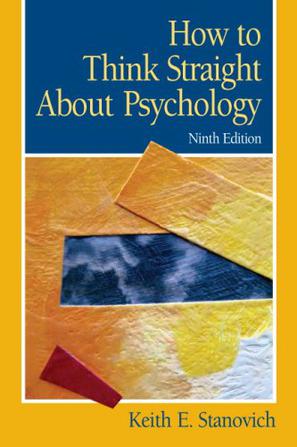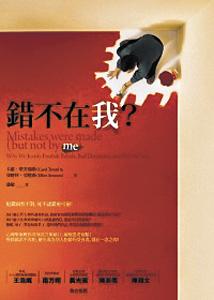欢迎来到相识电子书!
标签:刘未鹏荐
-
How To Think Straight About Psychology
Keith Stanovich'swidely usedand highly acclaimed book helps students become morediscriminating consumers of psychological information, helping them recognize pseudoscience and be able to distinguish it from true psychological research.Stanovich helps instructors teach critical thinking skills within the rich context of psychology. It is the leading text of its kind. How to Think Straight About Psychology says about the discipline of psychology what many instructors would like to say but haven't found a way to. That is one reason adopters have called it “an instructor's dream text” and often comment “I wish I had written it. It tells my students just what I want them to hear about psychology”. -
錯不在我?
為什麼公眾人物外遇,罪證確鑿時,當場抵死不認? 隔天的道歉聲明中卻說:「我犯了全天下男人都會犯的錯......」 為什麼人在事情突槌時只想逃避責任,甚至不自覺說謊? 無賴、傻子、罪犯和偽君子,都是自我辯解的慣犯? 心理學家教你看穿謊言與藉口,破解思考盲點! 美國心理學會、〈華爾街日報〉〈歐普拉O雜誌〉等媒體與《你該不該相信直覺?》、《領導,不需要頭銜》等暢銷書作家一致好評推薦! ◆從政治、法律、醫學、家庭、愛情與人際關係等各個角度,唯一獲得美國心理學會三項大獎的心理學專家完整剖析探討人類心理的最新力作,學界和媒體輿論一致推崇! ◆新書上市即高踞亞馬遜書店心理學分類榜前5名,百位讀者4~5顆星好評推薦! 人非聖賢,孰能無過──但是,你可以選擇加以掩飾,還是坦誠以對。 我們總是被教導要從錯誤中學習,但除非我們先承認犯了錯,才有可能學到些什麼。要從錯誤中學習,就必須了解那誘人的自我辯護到底是什麼。 「美國心理學界夢幻組合」的著名社會心理學家卡蘿.塔芙瑞斯和艾略特.亞隆森,毫不留情地檢視了我們大腦自我辯護的複雜作用。當我們犯錯,我們必須消弭 認知失調引起的焦慮。少了自我辯護的心理機制,我們難堪的痛苦就會延長,不停折磨自己,不斷懊悔當初沒有選擇另一條路。但是,不加思索的自我辯護就像流沙 一樣,會讓我們越陷越深。它阻礙我們看見自己犯錯,遑論要改正錯誤;扭曲現實,讓我們無法獲得評估局勢所需的資訊;使得愛人、朋友及國家間的嫌隙加深;讓 我們無法擺脫壞習慣;讓罪犯不為自己的行為負責;讓許多專家無法改變過時的態度和做法,而對公眾造成傷害。 本書奠基於多年研究,兩位作者以流暢有力的文字和生動有趣的事例,對自我欺騙行為提供了極為迷人的解釋──如何運作、導致何種傷害,以及我們如何克服。你可以翻過書頁,但要接受建議:你的逃避手段再也無所遁形。 -
Mistakes Were Made (But Not by Me)
Why do people dodge responsibility when things fall apart? Why the parade of public figures unable to own up when they screw up? Why the endless marital quarrels over who is right? Why can we see hypocrisy in others but not in ourselves? Are we all liars? Or do we really believe the stories we tell? Renowned social psychologists Carol Tavris and Elliot Aronson take a compelling look into how the brain is wired for self-justification. When we make mistakes, we must calm the cognitive dissonance that jars our feelings of self-worth. And so we create fictions that absolve us of responsibility, restoring our belief that we are smart, moral, and right—a belief that often keeps us on a course that is dumb, immoral, and wrong. Backed by years of research and delivered in lively, energetic prose, Mistakes Were Made (But Not by Me) offers a fascinating explanation of self-deception—how it works, the harm it can cause, and how we can overcome it.
热门标签
下载排行榜
- 1 梦的解析:最佳译本
- 2 李鸿章全传
- 3 淡定的智慧
- 4 心理操控术
- 5 哈佛口才课
- 6 俗世奇人
- 7 日瓦戈医生
- 8 笑死你的逻辑学
- 9 历史老师没教过的历史
- 10 1分钟和陌生人成为朋友



